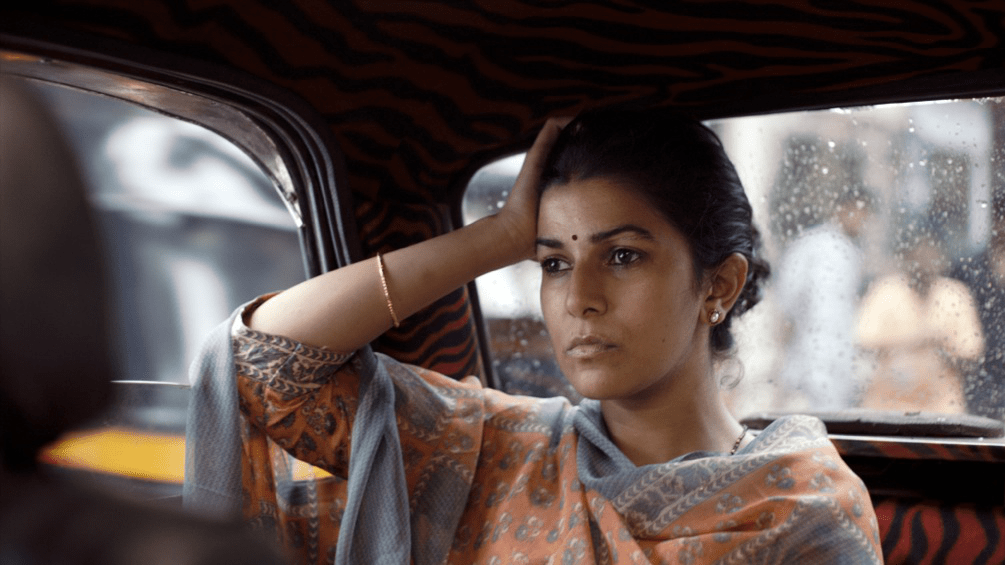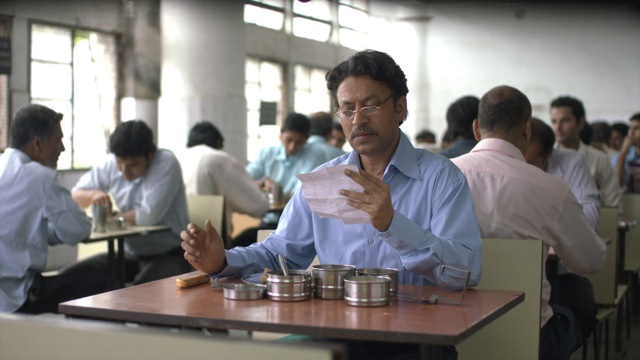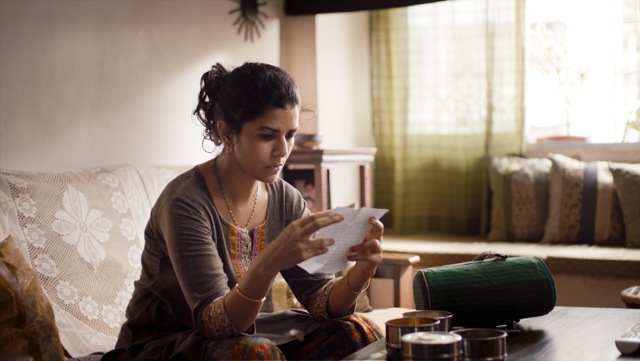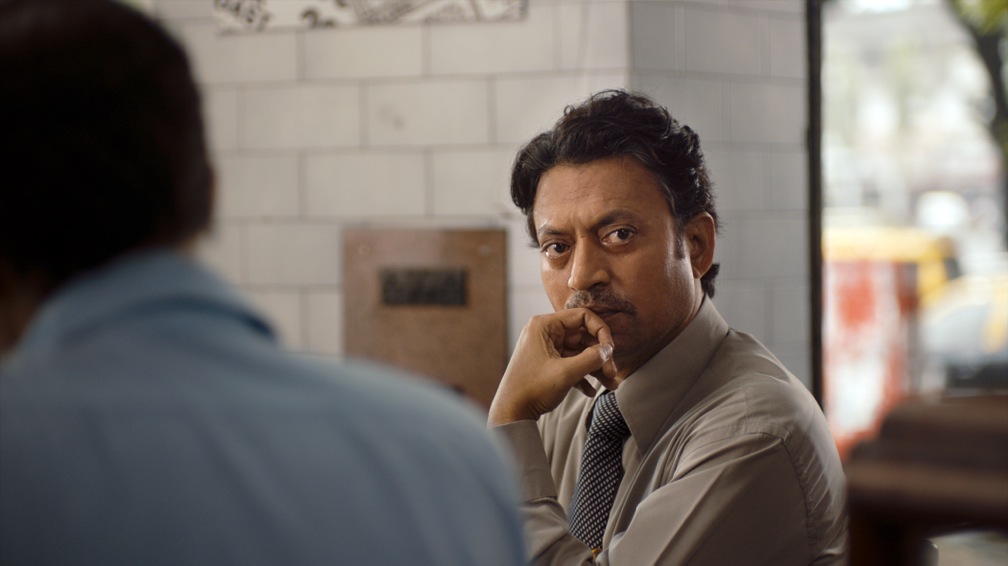It's true that one can find love in the unlikeliest of places. But in a lunch box?
Perhaps only in Mumbai, and maybe only in the movies. After all, if a child of Mumbai's streets can strike it rich on a TV show (Slumdog Millionaire), why can't an aging insurance man find love in a lunchbox?
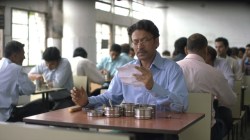 Sony Pictures Classics
Sony Pictures ClassicsAnd so it goes in The Lunchbox, now showing in limited U.S. release after lighting up the box office and the critics in India. "One of the best films to come out of India in a long time," raved one critic in Mumbai. Another called it "delicious and delightful," concluding, "The delectable taste of this lunchbox remains in your mouth much after you've left the theatre. Go for it!"
The Lunchbox was so well loved that a national scandal ensued when it was not selected to represent India in the foreign film category at the Academy Awards. (India selected The Good Road instead, but it was not one of the final five nominees.)
Now, back to that unlikely premise. Sajaan, a forlorn widower nearing retirement, is merely going through the dull motions in his last days on the job. Work is a drag, the commute is a drag, homelife is a drag (literally: he's a smoker), and even his daily lunch at the office is a . . . But wait, what's this? When he opens his lunchbox one day, he finds an extraordinary meal, full of zesty flavors, far exceeding his usual grub.
For years, Sajaan (Irrfan Khan, The Amazing Spider Man, The Life of Pi, and over 30 Bollywood films) has had his lunchbox filled and delivered by a local food vendor, whose fare did little for the taste buds. And then, suddenly, everything changed.
Which brings us to . . .
Ila, a lonely housewife who is also going through the motions, but is determined to spice up her loveless marriage. Ila (Nimrat Kaur) believes that the way to a man's heart is through his stomach, so she goes all Food Network in preparing her husband's lunches, hoping to arouse, well, something.
Which brings us to . . .
Mumbai's dabbawallahs, a community of 5,000 lunchbox deliverymen who distribute some 1 million meals per day—using trains, buses, scooters, bikes, and their own fleet feet—to workers throughout the city. Typically, they pick up the lunchbox at the worker's residence in the late morning—freshly made by a spouse, and still piping hot—and, once the food is eaten, return the lunchboxes to their homes in the afternoon.
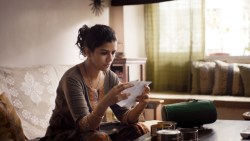 Sony Pictures Classics
Sony Pictures ClassicsI was in Mumbai recently, and it's amazing that such a system can work at all, given the logistics. It's the world's fifth most populous city, with 12.5 million people. It's also one of the most densely populated, with almost 21,000 people per square kilometer—twice as dense as New York, four times as dense as London. Mumbai is like a human beehive—practically wall-to-wall people, jostling with one another, literally shoulder-to-shoulder, just to get from here to there. And the traffic is a chaotic mess!
And yet, a Harvard University analysis of the dabbawallah system found, astonishingly, that only one in a million lunchboxes is ever delivered to the wrong address.
Which brings us to . . .
This film's namesake, which just happens to be that one in a million.
Ila, unaware that the lunch was delivered to the wrong person, gently quizzes her husband when he returns from work. How was lunch? He mostly ignores her, but manages to say he liked the cauliflower. Ila hadn't made cauliflower, and realizes something's up.
When she packs the next day's lunch, she includes a note to the stranger, thanking him for returning the lunchbox. After finishing that lunch, Sajaan replies with a note that it was delicious, but a bit salty. And so the story continues, with the lunchbox carrying notes—and Ila's scrumptious vittles—back and forth.
They ease one another's loneliness as the notes get more intimate—but not romantic. They share details of their lives, and even give each other advice. Sajaan encourages Ila, who has a young daughter, to consider having another child, because "sometimes a child can help a marriage." Ila encourages Sajaan to quit smoking . . . and so he tries.
They both reminisce about better days from their pasts. They both long for something more—something missing in their current humdrum lives. And still, they haven't met.
When Ila makes an upsetting discovery, her next note to Sajaan suggests something more. "My daughter learned in school that in Bhutan, everyone is happy. What if we had that here?" Sajaan's reply is even more direct: "What if I came to Bhutan with you?"
 Sony Pictures Classics
Sony Pictures ClassicsThey decide to meet in person. And then . . .
Nope, no spoilers. There are a number of ways this tale could end, and I'll just say that the ending isn't necessarily what you might expect. It's certainly not clichéd.
It's a cross between a romantic comedy and a drama, but not really either. Romance is merely hinted at, a whiff in the wind. The comedy is droll, but not dull. And the drama is anything but, well, dramatic.
Veteran actors Khan and Kaur are outstanding in the lead roles, perhaps most when they're not doing or saying anything. This film is a study in expressions, in subtlety, in restraint. Emotions are conveyed through the slightest tilt of the head, movement of the eyebrows, or turn of the corner of a mouth.
Kudos to rookie director Ritesh Batra—who also wrote the screenplay—for letting his stars' faces do much of the acting, and for the deliberate, measured pace of the slowly unfolding story. It never drags, but there's nothing resembling an action sequence either. It both requires and rewards a patient viewing.
The payoff? A gentle commentary on our human need for connection, companionship, and communication. Ila sums it up in one of her notes to Sajaan:
"I think we forget things if we have no one to tell them to."
Duly noted.
Caveat Spectator
The Lunchbox is rated PG for thematic material and smoking, but there is little to no objectionable content. Topics of adultery and death are discussed, but never depicted. In India, the film received a "U" rating for "Universal," suitable for all age groups. But given its slow pace and subject matter, plus the fact that the film is in both English and Hindi (with subtitles), children would likely be bored.
Mark Moring, a former film and music editor at CT, is a writer at Grizzard Communications in Atlanta.

